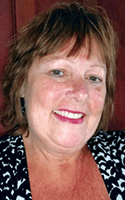Elizabeth Pritchard is director of community services for Upstate Cerebral Palsy in Herkimer and Oneida counties
By Barbara Pierce

“I love what I do. This is why I get up in the morning,” said Elizabeth Pritchard about her position as director of community services for Upstate Cerebral Palsy in Herkimer and Oneida counties.
In her position, Pritchard is responsible for several programs that provide vital services to persons with mental illness. These programs include a range of living options in supported residences in the community, case management services, a social club, and a drop-in center.
All of these programs change people’s lives. “I’m proud of what we do. We’ve made a big difference in so many lives,” she noted.
Pritchard was drawn to her momentous career 25 years ago when she was working toward a Bachelor of Arts degree in human services. A requirement for this degree is an internship in the field of human services.
Hunter House in Utica, which once provided housing for persons discharged from psychiatric care, was the site of her internship. Working with residents of the Hunter House had a powerful impact on her, and led to her career working with persons with mental illness.
“I was fascinated; my heart went out to the residents. I was so sad for persons in that position,” she said. She still remembers many of the persons with whom she worked.
“It had a real impact on me. I was determined to do something. I had found my passion,” she said in regards to her internship.
After earning her degree, she looked for an opportunity for a career that followed her passion. When she saw an ad for a community residential support professional, she pursued it.
And her career with Upstate Cerebral Palsy began.
“Our name, Upstate Cerebral Palsy, doesn’t explain who we work with or all that we do,” she clarified. “We have a wide array of services that support children and adults. I think the community doesn’t know all that we do.”
The folks she works with have a diagnosis of mental illness. “Mental illness is a nasty stigma,” she said. “But they’re folks just like us; they have the same dreams, the same desires.”
“Just because you have a mental illness, doesn’t mean you can’t have a life. There’s hope,” she added.
She gives the example of one of their clients who recently moved to North Carolina to live near her son. “She got a job there; she’s a real success story — all due to the support she had from us for 10 years. We offered assistance; she did the work,” Pritchard said.
“Like her, if an individual buys into the program and works hard, they get discharged and go on to bigger and better things,” she said. “We frequently get letters from people who have gone through the program or their families, so thankful for the program, and letting us know of their success. There’s hope.”
The community mental health residences offer a continuum of care to empower each person to maximize his or her potential. Participants live in apartments in the community, supported by Social Security and public assistance, which are increased to cover the cost of care. The residences offer staff supervision at different levels, depending on the needs of the individual.
Staff are either on site or available by phone 24-7. They supervise medication for each resident. “That’s the first thing,” explained Pritchard. “And we teach residents how to do the things they will have to do when they’re on their own, like vacuum, make healthy meals, and clean up after themselves.”
“Also, we teach symptom management, an important thing for each resident to understand. We ask, ‘What are the early warning signs of your illness, and when you get the warning signs, what do you do so that you don’t end up in the hospital?’” she said.
Goals for those living in the residences are to improve their individual functional living skills and encourage their eventual move to independent living.
Services are also provided to many persons with substance abuse issues, and substance abuse with mental illness. And to persons recently discharged from jail or the hospital.
“It works,” Pritchard noted. “The person has to buy into it.”
What qualities are important to have in the position of an administrator in an organization such hers?
“First, you have to be organized,” she responded. “And be a good listener. I oversee 25 staff. I have to multitask and deal with several challenging issues at the same time.”
